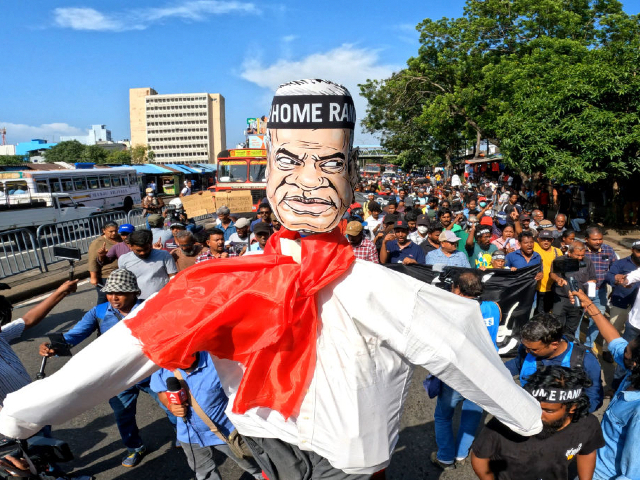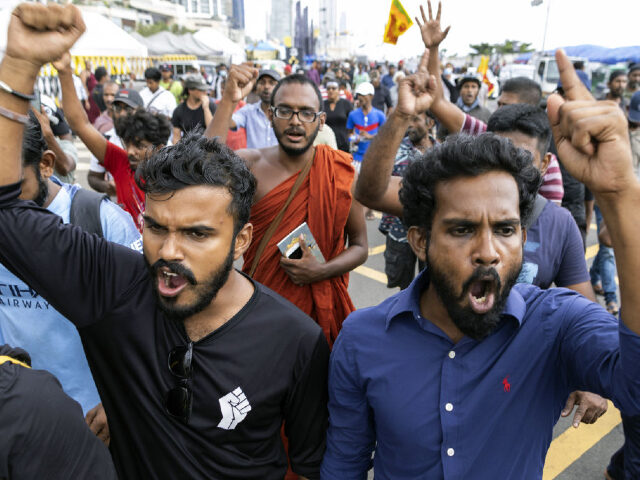Acting President of Sri Lanka Ranil Wickremesinghe won Wednesday’s presidential vote – to serve out fleeing former President Gotabaya Rajapaksa’s term – with 134 votes in an “election” by parliamentary elites immediately rejected by the nation’s mass protest movement.
Wickremesinghe’s formal assumption to the office of the presidency is unlikely to change the government policies that have motivated thousands to take to the streets and demand everyone in power resign. The former prime minister, who had agreed to step down from that post after protesters burned down his home this month, had a long record of serving at the highest levels of power long before the current crisis, including times both in opposition to and serving under the formerly ruling Rajapaksa family. Gotabaya Rajapaksa was the last of over 40 Rajapaksa family members who maintained a stranglehold on power in the island nation since brother Mahinda Rajapaksa ended the 26-year-old civil war between the government and Tamil separatists in the mid-2000s.
The Democratic Republic of Sri Lanka has been facing the worst economic crisis in its history since at least March, a result of the Rajapaksa family’s socialist policies that included lavish spending, taking out predatory loans offered under China’s Belt and Road Initiative (BRI), and implementing a “green” policy that banned the use of chemical fertilizer, making the nation dependent on imports for food. When the government ran out of foreign currency reserves, it lost its ability to purchase any imports, leaving the country with little to no access to food, gasoline, medicine, cooking gas, and other daily necessities. The shortages have triggered massive protests that have resulted in mobs burning down the homes of over 50 politicians.

Sri Lankan anti-government protesters carry an effigy of acting president Ranil Wickremesinghe while marching shouting slogans against the acting president Ranil Wickremesinghe during a protest at Colombo, Sri Lanka. 19 July 2022 (Photo by Tharaka Basnayaka/NurPhoto via Getty Images)
Sri Lanka hosts a variety of political parties with little ideological differences between them; all major parties are socialist, left-wing parties. The Rajapaksa-led Sri Lanka Podujana Peramuna (SLPP) split between supporting Wickremesinghe and supporting his primary challenger, an actual member of the SLPP, Dullas Alahapperuma. Immediately following the announcement of Wickremesinghe’s victory, protesters convened to demand he resign.
According to the Sri Lankan news outlet Ada Derana, 219 people – the members of Parliament – exercised the privilege of electing the nation’s president on behalf of its 22 million people. Wickremesinghe won the votes of 134 of those people and will be inaugurated on Thursday. Alahapperuma received 82 votes; a third candidate, Anura Kumara Dissanayaka, received three votes.
While Wickremesinghe, who declared a state of emergency after protesters burned his house down and seized the presidential palace, had ordered heightened security around the Parliament building, protesters began convening as the votes were counted – and immediately demanded Wickremesinghe resign after he was elected.
Satyagraha by the Protesters. #DailyMirror #SriLanka #SLnews pic.twitter.com/ZVR1Pp5dVh
— DailyMirror (@Dailymirror_SL) July 20, 2022
“A large number of people were gathered demanding the removal of Gotabaya Rajapaksa as the first key demand. Our second key demand is that Ranil Wickremesinghe should resign. Now Mr. Wickremesinghe was elected as the president today,” an unnamed protester said in an address to the crowd, according to the Sri Lankan Daily Mirror. “But we know how people came to the streets to continue this struggle against the Rajapaksa regime and Ranil Wickremesinghe. We understand that the parliament today took a decision against the people’s will.”
The Colombo Telegraph, which generally publishes anti-government content, described Wickremesinghe as having absolutely no mandate from the general public, as he was not elected to the prime ministership when replacing Mahinda Rajapaksa in May and was not holding any elected office at the time.
“He was not elected to Parliament at the last election. The party he led, the UNP was wiped out at the ballot box. He is in Parliament as the sole MP of his party on the national list, though he lost his home district and city by a huge margin,” the Telegraph‘s Dayan Jayatilleka observed.
Wickremesinghe attempted to address the expected popular outrage at his election after the vote was announced.
“The people are not asking us for old politics,” the former prime minister said in his victory speech. “I request Opposition leader Sajith Premadasa and other opposition parties including former Presidents Mahinda Rajapaksa and Maithripala Sirisena to work together.”
Wickremesinghe served as prime minister five times before becoming president on Wednesday: from 1993 to 1994, from 2001 to 2004, under Sirisena from 2015-2019, and again for the past month after protesters burned down the home of the prime minister in office before him in May, Mahinda Rajapaksa.
His term under Sirisena pitted him directly against Mahinda Rajapaksa – the president credited with ending the civil war – in 2018, when Sirisena attempted to unconstitutionally replace him with Rajapaksa, his predecessor in office. Wickremesinghe’s ouster, who did not last, prompted at least one major brawl in the Sri Lankan parliament in which lawmakers beat each other and threw chili powder in each other’s eyes.
The Colombo Telegraph reported, citing anonymous sources, that Gotabaya Rajapaksa, currently in Singapore, spent much of the week prior to the election lobbying lawmakers to vote for Wickremesinghe. Rajapaksa initially fled to the Maldives after the presidential palace takeover, but Sri Lankans in the country protested and demanded he leave. Singapore has also indicated it will not allow Rajapaksa to remain in the country, partially due to its large Sri Lankan population’s resistance to him.
“Rajapaksa is caught between a rock and a hard place, sources close to Gotabaya Rajapaksa told Colombo Telegraph, after Singapore determined that he cannot stay more than a fortnight in the island as a visitor,” the Telegraph reported. “Singapore is home to a large Tamil population and the Government of the country fears unrest and protests could erupt if the country were to host the unpopular Sri Lankan leader for too long.”
With Wickremesinghe as president, the newspaper asserted, Gotabaya Rajapaksa may feel safe enough to return home. To that end, the Telegraph claimed on Tuesday, “phone lines are buzzing between Singapore and Colombo as Rajapaksa engages in frantic negotiations with the SLPP caucus to secure the votes Wickremesinghe needs on Wednesday to be elected to complete Gotabaya’s five-year term.”

COMMENTS
Please let us know if you're having issues with commenting.